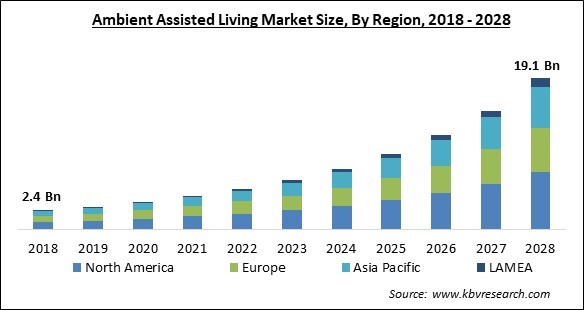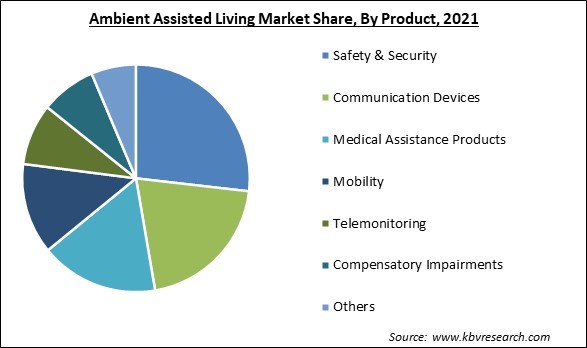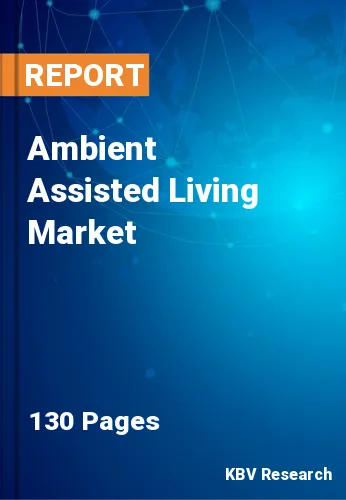The Global Ambient Assisted Living Market size is expected to reach $19.1 billion by 2028, rising at a market growth of 24.5% CAGR during the forecast period.
Ambient assisted living (AAL) is a technology-enabled service that helps older citizens with disabilities live more independently within their homes. Ambient Assisted Living (AAL) uses devices and techniques to ensure that older person is safe in their homes.

These devices are sensors IoT (Internet of Things) and mobile devices to connect people with healthcare professionals & caregivers when in need. The main objectives of AAL are to enhance the quality of life, independence & safety of older people. It further includes wireless networks, smart devices, computers, medical sensors & software applications.
These technologies ensure aging in the chosen place by the individual. AAL makes lives more accessible and, to some extent, less dependent on others. The methods & techniques utilized in AAL are user-centric and integrated into the user's living environment. Its utilization by older adults can be advantageous as it aids in preventing, curing, and enhancing their wellness.
The demographic changes have led to the introduction of AAL technologies. AAL can reduce the high cost associated with healthcare. People want a superior quality of life at every stage. So AAL provides the user with the potential to live alone without the need for anybody’s assistance. AAL addresses comfort and security concerns by integrating itself with the social environment.
The COVID-19 pandemic has adversely impacted the Ambient Assisted Living (AAL) market. As the pandemic spread, the pressure on the healthcare industry continued to rise. It included handling the pandemic infected patients, regular check-ups, regular hygienic processes, and monitoring of the elderly population & vulnerable patients. The COVID-19 affected patients were very harmful to older people as they have weak immunity, which puts them at higher risk of infection. That is why devices which can ensure safety & health monitoring of old adults from their homes become popular. Due to their smart home technologies & services, they are expected to move the ambient assisted living market at a faster growth rate.
According to the WHO, one in every six people in the world will be aged 60 years or over by 2030. During that time, the share of the population aged 60 years or over will rise from 1 billion in 2020 to 1.4 billion. By 2050, the world’s population of people aged 60 years & older will double to 2.1 billion. The number of persons aged 80 years or older is also expected to triple between the years 2020 & 2050 (426 million). By 2050, two-thirds of the world’s population over 60 is expected to live in low- and middle-income nations. The rising geriatric population and numerous health conditions related to old age are expected to increase the utilization of ambient assisted living devices and propel market growth.
Healthcare services provided by home health aides and personal care aides are likely to experience more growth and demand than almost any other occupation in coming years. At present, there are millions of nurses & aides working in this field, and that number is expected to increase significantly in the next decade. This is described as a much faster-than-average rate compared to all other occupations. A growing preference for home-based care over institutionalized care is boosting the demand for ambient assisted living devices & solutions, and thus supporting the market growth.
Choosing the most efficient technology is related to not only functionality & compatibility but also cost. The high cost of the Ambient Assisted Living (AAL) devices cost is the most common factor for the low adoption rate of smart homes. Development in rural areas is challenged explicitly by the cost aspect due to the average income, which is lower than the urban regions. Thus, the universal application of AAL technology in rural areas is not viable due to the high cost, which is not economically accessible to many consumers. The high price of the devices and issues faced while implementing ambient assistance living devices will hinder the market growth.

Based on the product, the ambient assisted living market is segmented into medical assistance products, safety & security, telemonitoring, mobility, communication devices, compensatory impairments and others. The communication devices segment procured a significant revenue share in the ambient assisted living market in 2021. This is due to their usage in connecting the patients with their families & care providers. These devices are utilized to receive & send phone calls, text messages, video chat and more. These types of technology are highly beneficial for people with physical or cognitive disabilities who might have difficulty communicating.
| Report Attribute | Details |
|---|---|
| Market size value in 2021 | USD 4.3 Billion |
| Market size forecast in 2028 | USD 19.1 Billion |
| Base Year | 2021 |
| Historical Period | 2018 to 2020 |
| Forecast Period | 2022 to 2028 |
| Revenue Growth Rate | CAGR of 24.5% from 2022 to 2028 |
| Number of Pages | 130 |
| Number of Tables | 210 |
| Report coverage | Market Trends, Revenue Estimation and Forecast, Segmentation Analysis, Regional and Country Breakdown, Companies Strategic Developments, Company Profiling |
| Segments covered | Product, Region |
| Country scope | US, Canada, Mexico, Germany, UK, France, Russia, Spain, Italy, China, Japan, India, South Korea, Singapore, Malaysia, Brazil, Argentina, UAE, Saudi Arabia, South Africa, Nigeria |
| Growth Drivers |
|
| Restraints |
|
Region-wise, the ambient assisted living market is analyzed across North America, Europe, Asia Pacific, and LAMEA. The North America region registered the largest revenue share in the ambient assisted living market in 2021. The growth is attributed to the rising adoption of smart homes and high technical expertise. The region has a vast customer base and a proclivity toward new technology. Also, the world’s aging population is anticipated to positively impact the demand for energy-saving and low-carbon emission-oriented solutions considerably. The rising number of old adults coupled with technological advancements is expected to propel further the growth of the ambient assisted living market in the region.
Free Valuable Insights: Global Ambient Assisted Living Market size to reach USD 19.1 Billion by 2028
The market research report covers the analysis of key stake holders of the market. Key companies profiled in the report include Honeywell International, Inc., Panasonic Corporation, ADT, Inc., EnOcean GmbH, 2PCS Solutions GmbH, Assisted Living Services, Inc. (Assisted Living Technologies, Inc.), Televic Group NV, Bay Alarm Medical (Bay Alarm Company), Sensara B.V., and LifeStation, Inc.
By Product
By Geography
The global Ambient Assisted Living Market size is expected to reach $19.1 billion by 2028.
The rising geriatric population are driving the market in coming years, however, High implementation cost restraints the growth of the market.
Honeywell International, Inc., Panasonic Corporation, ADT, Inc., EnOcean GmbH, 2PCS Solutions GmbH, Assisted Living Services, Inc. (Assisted Living Technologies, Inc.), Televic Group NV, Bay Alarm Medical (Bay Alarm Company), Sensara B.V., and LifeStation, Inc.
The expected CAGR of the Ambient Assisted Living Market is 24.5% from 2022 to 2028.
The Safety & Security segment is leading the Global Ambient Assisted Living Market by Product in 2021 thereby, achieving a market value of $4.8 billion by 2028.
The North America market dominated the Global Ambient Assisted Living Market by Region in 2021, and would continue to be a dominant market till 2028; thereby, achieving a market value of $7.2 billion by 2028.
Our team of dedicated experts can provide you with attractive expansion opportunities for your business.

